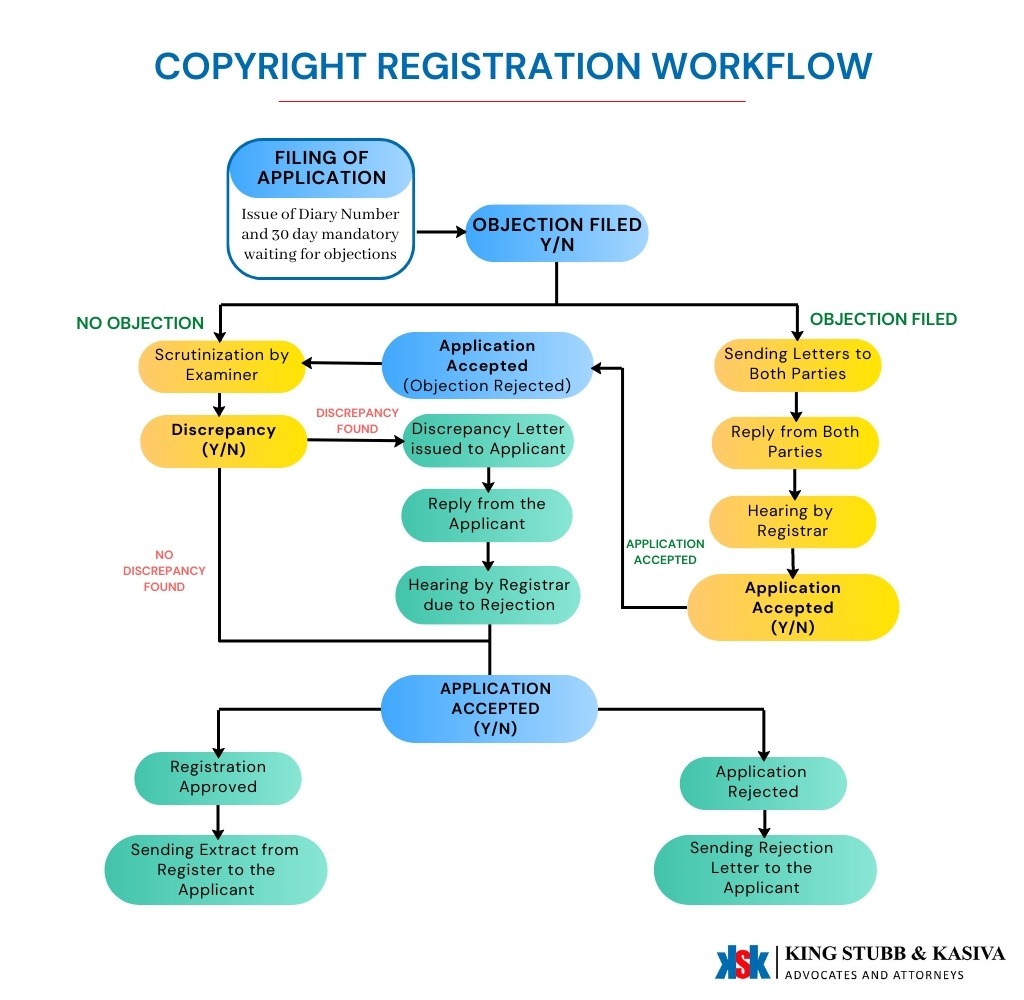
By - Juhi Chandel on November 18, 2022
Imagine producing a fresh novel, a literal masterpiece with the potential to make a large sum of money but envisage being apprehensive that after it is published, someone may copy it and publish it as their own. What must one do to stop this and safeguard their rights?
In such a situation one might want to apply for a Copyright or register for the Copyright of a masterpiece. Intellectual Property Lawyers in India can assist and provide guidance on how to register a copyright in India. In this article, we shall discuss how to apply for copyright in India and the process of registration of copyright in India.
According to the Copyright Act of 1957, a “work is any artistic creation, including a painting, a sculpture, a drawing (including a diagram, a map, a chart, or plan), an engraving, a photograph, a work of architecture or artistic craftsmanship, a play, a book, a computer program, a database, a song, a sound recording, or a motion picture.” [1]
The Copyright Act, of 1957 has updated India's copyright laws to reflect advancements in the information technology sector, including satellite broadcasting, computer software, and digital technology, in order to keep up with the demand for worldwide harmonisation.
We at King Stubb & Kasiva have a specialized team of Intellectual property lawyers in India who are meticulous and reliable in the development or selection of new inventions in the targeted field; checking and verifying the originality and acceptability of the inventions or creations; drafting applications for registration with the targeted authority; pursuing a prompt and perfect registration; monitoring and protecting the said IP; and legal action for infringement.
Applying for copyright registration in India is an added benefit because it safeguards the ownership of the work against unnecessary disputes. “A copyright Registration Certificate” and the “Register of Copyright”, which contains information about registered copyrights, are regarded as “admissible evidence” in a court of law in the event of a potential copyright infringement issue. These act as the first supporting evidence in disputes over copyright ownership.
How to apply for the copyright of a logo in India is one of the most sought-after questions as the logo creates a distinctive presentation of a brand in the global market and it is essential for the same to be copyrighted in order to protect the brand’s identity and values it holds. Intellectual Property lawyers in India dedicate their time to helping an individual or a company through the process of applying or registering for copyrights in India.
Below are the documents required for copyright based on the type of work:
| Type | Document Required |
| Artistic | Two Soft copies of the work Demand Draft NOC (No Objection Certificate) from author / Applicant. NOC from the publisher (if work published and publisher is different from applicant) Search Certificate issued by Registrar of Trademarks NOC from a person whose photograph appears on the work |
| Cinematograph Film | Two Soft copies of the work Demand Draft NOC from Various Copyright Holders / Agreement Copy NOC from the publisher (if work published and publisher is different from applicant) |
| Music | Two Soft copies of the work Demand Draft NOC from Publisher (if work published and publisher is different from applicant) NOC from Author (if the applicant is other than the author) |
| Literary/Dramatic | Two Soft copies of the work Demand Draft NOC from Publisher (if work published and publisher is different from applicant) NOC from Author (if the applicant is other than the author) |
| Sound Recording | Two Soft copies of the work Demand Draft NOC from Various Copyright Holders / Agreement Copy NOC from the publisher (if work published and publisher is different from applicant) |
| Software | Two Soft copies of the work Source code and object code of work for verification Demand Draft NOC from Publisher (if work published and publisher is different from applicant) NOC from Author (if the applicant is other than the author) |
The creator or a person who has obtained the rights to the original work can register for copyright in India. If the original work is created during the time of employment, it can be called “work made for hire” and in such a case the employee is not considered an author of the original work. This title goes to the employer.
If more than one person creates the original work, co-ownership of the copyright is sought unless otherwise agreed upon.
The following individuals can apply for the copyright of a workpiece in India:
A minor is also permitted to register a copyright, and there is no age restriction for obtaining one. This is so because creativity was recognised by copyright law, which also recognises that creativity cannot be constrained by age. Additionally, unless they have decided differently, the creators of the work are co-owners if it was made by two or more people.
Let us now examine the steps for copyright registration in accordance with Chapter X of the Indian Copyright Act, 1957, and Rule 70 of the Copyright Rules 2013:
Step 1: Filing an application
A separate application needs to be filed for each unique work with the registrar along with relevant documents as stated above. There is a different fee involved for different kinds of work to be copyrighted. The same should be confirmed and paid through a Demand Draft (DD) or Indian Postal Order (IPO) addressed to the Registrar of Copyrights payable at New Delhi or through an e-payment facility.
In the case of online registration, user registration on the government website is essential. Once the application is submitted along with the necessary documents you will get the dairy number (acknowledgement).
Step 2: Examination of the Work
There is a requirement for a 30-day wait period upon issuance of the diary number. During this time, the copyright examiner reviews the application and any objections can be made and reviewed during this period. The flowchart below explains the copyright registration workflow:

Step 3: Registration of the Copyright
The process of registration of copyright completes when the applicant is issued the Extracts of the Register of Copyrights (ROC).
The copyright registration process, despite the fact that it seems simple, is a time-consuming but crucial process that can take up to 10 to 12 months. It is usually a good idea to register the copyright. This is due to the fact that it can significantly contribute to preserving the rights of the copyright holder even after they're passing away. At King Stubb & Kasiva (KSK), we uphold the principles of promptness, accuracy, and integrity and try to make the copyright registration process undemanding for our clients.
It is in a person’s best interest to have their intellectual property well-protected. With a registered copyright, it is much simpler to go to court in case of unauthorized use of the copyrighted piece of work.
[1] https://www.copyright.gov.in/